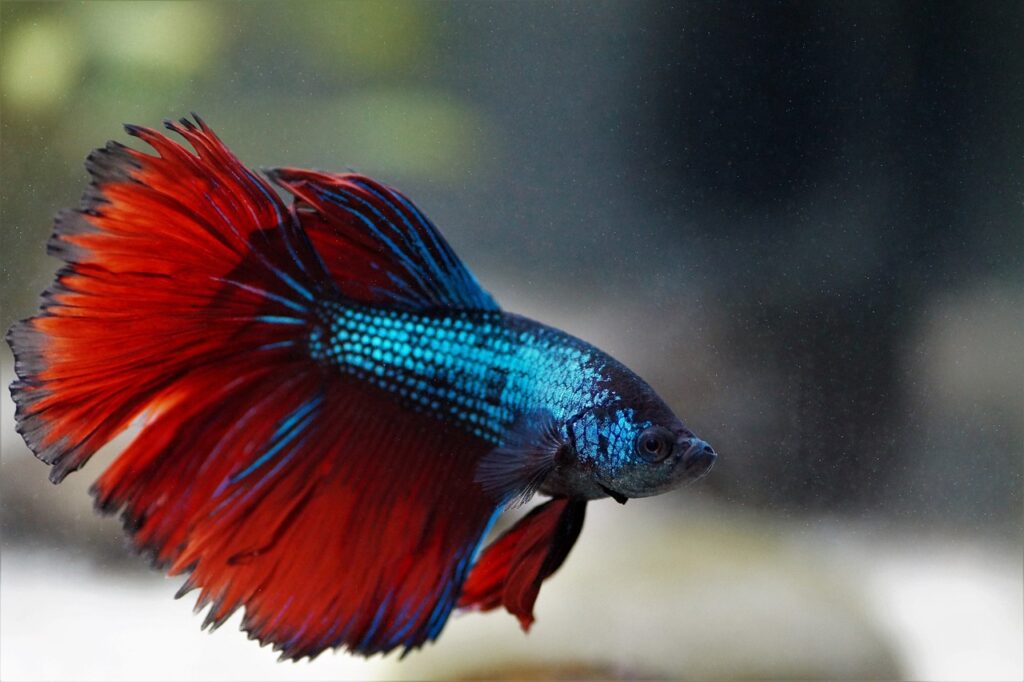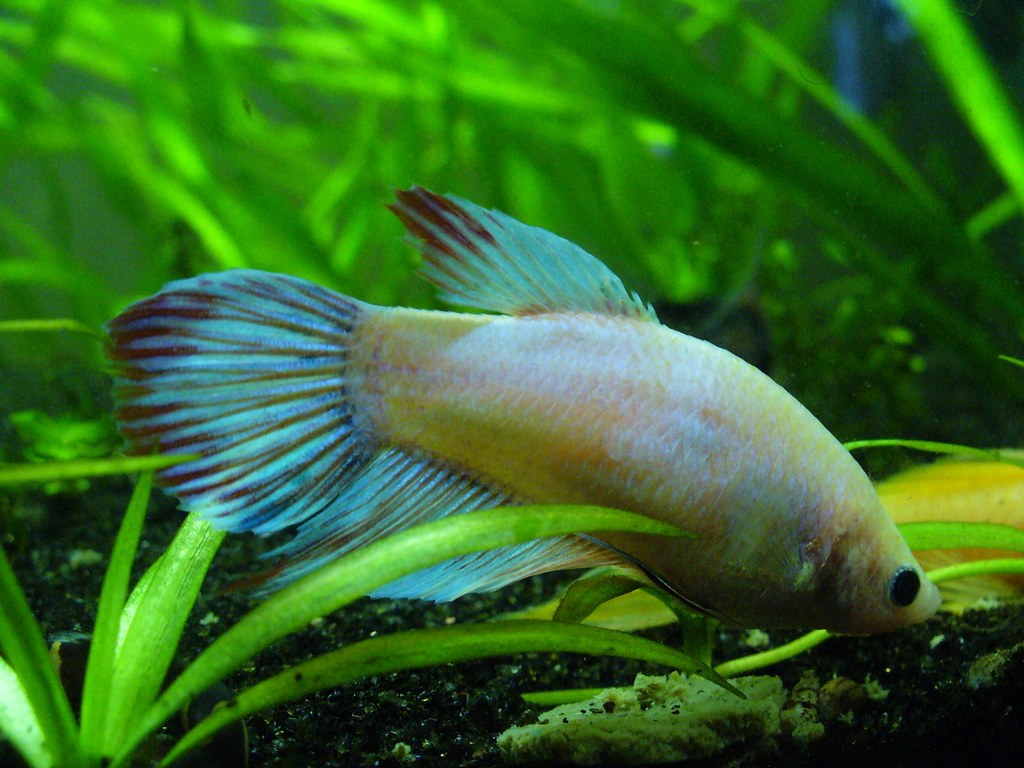Do you ever look at your aquarium and wonder, “why is my betta fish not eating?” If so, you’re not alone. Betta fish, also known as Siamese fighting fish, are known for their colourful scales, majestic fins, and distinctive personalities. Understanding their behaviour is crucial to keeping them healthy and happy.
Understanding Betta Fish Eating Habits
Normal Feeding Pattern
Betta fish are carnivores by nature. Their diet in the wild comprises small insects, larvae, and even smaller fish. In a domestic setting, they can be fed a variety of high-protein foods including betta pellets, brine shrimp, and bloodworms. Normally, they’re enthusiastic eaters and look forward to feeding time.
Changes in Feeding Behaviour
A shift in your betta’s eating habits, especially a refusal to eat, can indicate an issue that needs your attention. If your vibrant companion turns into a picky eater or stops eating altogether, don’t panic. It’s your cue to play detective and uncover the cause behind the change.

Common Reasons Why Betta Fish Stop Eating
Environmental Stress
Environmental stress is one of the common reasons why betta fish may lose their appetite. Let’s explore some of the environmental stressors that can lead to a betta fish refusing to eat.
- Inadequate Tank Size: Betta fish require adequate space to swim and thrive. Keeping them in tanks that are too small or cramped can cause stress and anxiety, leading to a loss of appetite. It is recommended to provide betta fish with a tank that is at least 5 gallons in size, with ample swimming space and suitable hiding spots.
- Improper Water Temperature: Betta fish are tropical fish and require a stable water temperature within a specific range for optimal health. Fluctuations in temperature, as well as water that is too cold or too warm, can stress betta fish and disrupt their feeding patterns. It is essential to maintain the water temperature between 75-80 degrees Fahrenheit (24-27 degrees Celsius) using a reliable aquarium heater.
- Aggressive Tankmates: Keeping betta fish with incompatible tankmates can lead to aggression and stress. Betta fish are known for their territorial nature, and when housed with aggressive or fin-nipping fish, they may become stressed and refuse to eat. It is advisable to carefully select tankmates that are peaceful and compatible with betta fish to maintain a harmonious environment.
- Inadequate Hiding Places: Betta fish appreciate having hiding places in their tanks. Without adequate hiding spots, they may feel exposed and stressed, leading to a loss of appetite. Providing live or artificial plants, caves, and other suitable structures can help create a secure and stimulating environment for betta fish.
Poor Water Quality
One of the most significant factors contributing to environmental stress in betta fish is poor water quality. Betta fish are highly sensitive to water conditions, and when the water becomes polluted or unbalanced, they may experience stress, leading to loss of appetite. Ammonia and nitrite buildup, high levels of nitrate, improper pH levels, and inadequate filtration can all contribute to poor water quality.
Illness and Disease
Betta fish are prone to various illnesses and diseases that can impact their appetite and overall health. When a betta fish stops eating, it can be an indication of an underlying health issue. Here are some common illnesses and diseases that can cause betta fish to lose their appetite.
- Swim Bladder Disorder: Swim bladder disorder is a common ailment in betta fish that affects their buoyancy and ability to swim properly. When afflicted with this condition, betta fish may have difficulty reaching the water’s surface to eat or may experience discomfort when attempting to consume food. This can lead to a loss of appetite and reluctance to eat.
- Fungal Infections: Fungal infections, such as cotton wool disease or fin rot, can occur in betta fish. These infections can cause physical discomfort, loss of appetite, and a decrease in activity. Fungal growth on the body or fins can interfere with a betta fish’s ability to eat, resulting in a diminished appetite.
- Bacterial Infections: Bacterial infections, such as columnaris or bacterial fin rot, can impact a betta fish’s health and appetite. These infections often manifest as open sores, ulcers, or discoloured patches on the fish’s body. The discomfort caused by bacterial infections can lead to a loss of appetite and decreased interest in food.
- Parasitic Infestations: Parasites, such as ich (white spot disease), can affect betta fish and cause irritation, inflammation, and itching. The presence of parasites on the body and gills can make eating uncomfortable for the fish, leading to a decrease in appetite. Additionally, severe infestations can weaken the fish’s immune system, further contributing to appetite loss.
- Internal Organ Issues: Problems with the internal organs, such as liver or kidney diseases, can affect a betta fish’s appetite. When these organs are not functioning properly, it can result in a loss of appetite and reduced interest in food. Monitoring the fish’s behaviour and consulting with a veterinarian can help diagnose and address internal organ issues.
Overfeeding
Interestingly, overfeeding your betta can also cause them to stop eating. If your fish has a bloated belly or is lethargic, it could be suffering from constipation due to overfeeding.

How to Get Your Betta Fish to Eat Again
Checking Water Parameters
Ensure your tank has ideal conditions: a steady temperature of 76-80°F (24-27°C), pH level of 6.5-7.5, and zero ammonia.
Varying Their Diet
Try different food items. Live or frozen brine shrimp or daphnia can often entice your betta back to eating.
Consulting a Vet
If your betta continues to refuse food, seek professional advice. A qualified vet can help diagnose and treat any underlying diseases.
Prevention is Better than Cure
Routine Water Changes
Regular water changes can help maintain good water quality, reducing stress and keeping your betta healthy.
Regular Health Checks
Keep an eye on your betta’s behaviour and appearance. Early detection of any signs of illness can greatly improve your betta’s chances of recovery.
Conclusion: Ensuring Your Betta Fish Eats Well
Maintaining your betta’s appetite involves more than just feeding them. Understanding their needs, maintaining their environment, and regularly monitoring their health can ensure they stay healthy and content. Remember, a well-fed betta is a happy betta!
How long can a betta fish survive without eating?
Adult betta fish can survive for up to two weeks without food. However, it’s not advisable to leave them unfed for that long.
Are there specific foods that betta fish prefer?
Betta fish prefer a diet rich in protein. They enjoy betta pellets, brine shrimp, bloodworms, and daphnia.
What are signs of a sick betta fish?
Signs include faded colours, lethargy, irregular swimming patterns, bloated belly, and refusal to eat.
Can I overfeed my betta fish?
Yes, overfeeding can lead to health issues like bloating and constipation.
How often should I change my betta fish’s water?
For smaller tanks, a partial water change should be done every 3-4 days. For larger tanks, every 7-10 days is sufficient.

